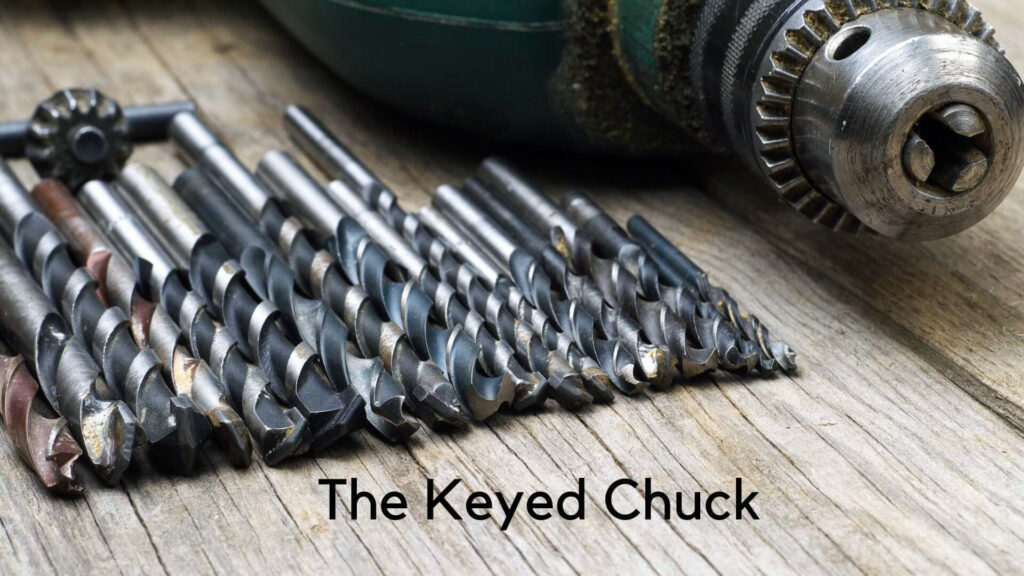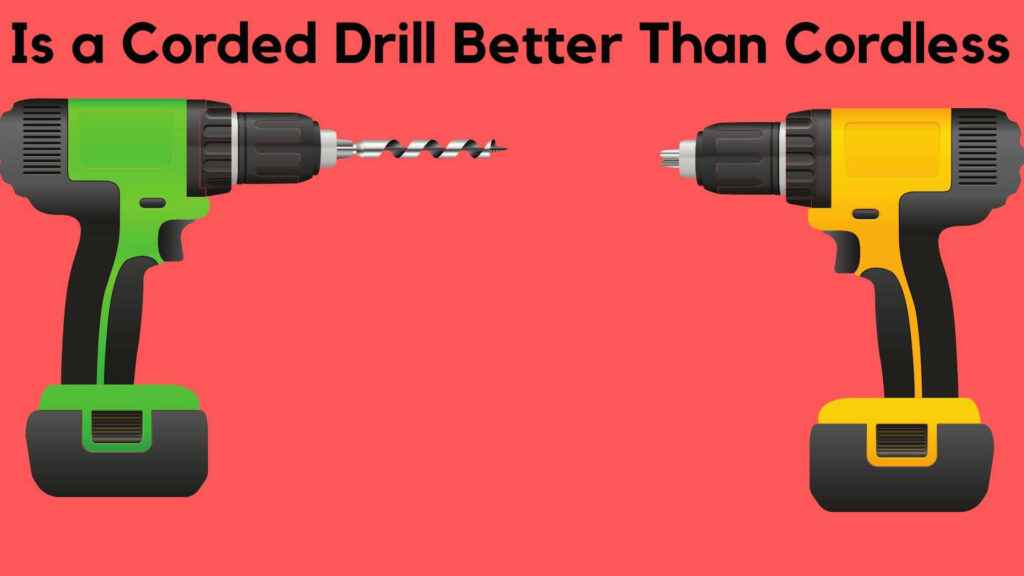When choosing between a corded and a cordless drill, the decision can be overwhelming, especially when both options have their distinct advantages and limitations. Each type of drill has its own set of features that makes it suitable for certain tasks, so understanding the differences is key to picking the right tool for the job. In this blog, we will break down the characteristics of both corded and cordless drills to help you decide which option is better suited for your specific needs.
Table of Contents
What is the Difference Between a Corded and Cordless Drill, and How to Decide Which to Choose for the Job?
The primary difference between corded and cordless drills lies in their power sources. A corded drill is powered by a direct connection to an electrical outlet, giving it a consistent flow of energy. This makes corded drills more powerful and reliable for heavy-duty tasks. On the other hand, a cordless drill relies on a rechargeable battery, offering portability and ease of movement. Cordless drills are better suited for lighter tasks where you may need to move freely without being tethered by a cord.
To decide which drill to use for the job, consider the type of work you’ll be doing:
- Heavy-duty tasks (e.g., drilling into masonry, metal, or hardwood) often require the consistent power and torque of a corded drill.
- Light to medium tasks (e.g., drilling into drywall, wood, or assembling furniture) are more suited to the portability of a cordless drill.
- If your work environment lacks nearby power outlets, a cordless drill will provide the flexibility you need.
- For extended use without worrying about battery life, a corded drill is a better choice.
Overview of Corded Drill
The Power
Corded drills generally offer more power compared to cordless models. Since they are plugged into an electrical outlet, they don’t suffer from the gradual power decline experienced by battery-powered drills. This makes them ideal for heavy-duty tasks like drilling through thick materials such as concrete, masonry, and metal.
Corded drills are also consistent in performance, as they don’t require recharging or battery changes. You can expect a steady torque throughout the duration of your project.
The Keyed Chuck

Many corded drills come with a keyed chuck, which is used to tighten or loosen the drill bit securely. This system provides a tighter grip on the bit, which is particularly useful when performing tough drilling tasks. However, some newer models also feature keyless chucks that offer quicker bit changes without needing a key.
Why Use a Corded Drill?
A corded drill provides consistent power and higher torque for demanding tasks, without the worry of battery life running out. It’s ideal for heavy-duty jobs and extended use, offering reliable performance and generally being lighter and more cost-effective than cordless models. However, it has limited mobility due to the need for a power outlet.
PROS
- Constant Power Supply: One of the most significant advantages of a corded drill is its ability to run continuously without the need for recharging. This makes it ideal for long, uninterrupted work sessions.
- Higher Torque: Corded drills often deliver more torque than their cordless counterparts, making them a better choice for demanding tasks like drilling through hard surfaces.
- Lightweight: Since they don’t carry a battery, corded drills are generally lighter than cordless models, making them easier to handle for extended periods.
- Cost-effective: Corded drills tend to be less expensive than cordless models since there is no need for batteries or chargers.
CONS
- Limited Mobility: The cord restricts your movement and requires access to a nearby power outlet, making it less convenient for tasks in areas without power or when working far from the source.
- Cumbersome Cord: The cord can get in the way, especially when moving around the job site. Tripping over the cord or damaging it is a potential hazard.
- Less Portable: Since corded drills require an electrical outlet, they are less portable and not ideal for use in outdoor areas where power may not be readily available.
Overview of Cordless drills
Cordless drills are powered by rechargeable batteries, typically lithium-ion or nickel-cadmium. They have become increasingly popular due to their portability and convenience, making them a go-to choice for DIYers and professionals alike.
Accessibility
The standout feature of cordless drills is their portability. Without the need for a power cord, cordless drills can be used almost anywhere. This allows for flexibility when working in remote locations or in tight spaces where a cord would be impractical. Additionally, advancements in battery technology have led to longer battery life, faster charging times, and increased power for cordless drills.
Why Should You Choose a Cordless Drill?
A cordless drill offers greater mobility and convenience as it operates without the need for a power outlet. It’s perfect for light to medium tasks and outdoor projects where access to electricity may be limited. Cordless drills are versatile, easy to use, and eliminate the hassle of managing cords, making them ideal for quick jobs and on-the-go tasks.
PROS
- Portability: Cordless drills provide the freedom to move around without being limited by a power cord. This is especially useful when working outdoors, on ladders, or in tight spaces.
- Convenience: Battery-operated drills eliminate the need for an electrical outlet, allowing you to work in remote areas or on the go.
- Versatility: Most cordless drills come with multiple speed settings, torque adjustments, and reversible features, making them versatile for a wide range of tasks.
- Ergonomic Design: Many cordless drills feature an ergonomic design with rubberized grips, reducing hand fatigue during prolonged use.
CONS
- Limited Battery Life: Cordless drills are dependent on battery power, which can deplete over time. While newer models have improved battery life, running out of charge mid-task can be frustrating.
- Heavier: The addition of the battery makes cordless drills heavier than corded models, which may cause fatigue during long jobs.
- Reduced Power: While advancements have been made, cordless drills still don’t deliver the same level of power and torque as corded drills. For heavy-duty drilling, a corded drill is often a better choice.
The Best Drills, According to Our Experts
When it comes to picking the best drill, it largely depends on your specific needs. Below, we highlight some top choices for both corded and cordless drills:
Corded Power Tools
- DEWALT DW223G 7 Amp 3/8-Inch Drill: Known for its powerful motor, this corded drill delivers consistent torque and speed. It is ideal for heavy-duty jobs where reliability and power are crucial.
- Ryobi D48CK 5.5-amp, 3/8-inch variable-speed corded drill: This model provides excellent balance between power and control. It’s a great choice for household tasks and occasional heavy-duty work.
Cordless Drills
- DeWalt DCD771C2 20-Volt MAX ½” Cordless Drill/Driver: This cordless drill delivers impressive power with a 20V battery. It’s lightweight, versatile, and ideal for both DIY and professional projects.
- Milwaukee M18 12″ Cordless Drill/Driver 2606-22CT: A high-performance drill with excellent battery life and durability. It’s perfect for users who need portability without sacrificing power.
Read More: Best Corded Drill under $100 You Should Consider!
FAQS (Frequently Asked Questions)
Is a corded drill better than a cordless drill?
There is no definitive answer to this question, as it depends on the nature of the work you’re doing. Corded drills are better for heavy-duty tasks and long periods of use, while cordless drills excel in terms of portability and convenience for lighter or medium tasks.
What are the benefits of using a corded drill over a cordless one?
The primary benefits of a corded drill include continuous power, higher torque, and lightweight construction. Since you don’t have to worry about battery life, a corded drill is a reliable tool for long-term, demanding tasks.
Are there any disadvantages to using a corded drill over a cordless one?
The main disadvantages of a corded drill are its limited mobility and the potential for the cord to get in the way. Additionally, you need to have access to a power outlet, which can be inconvenient in certain situations.
Final Thought
In conclusion, both corded and cordless drills have their advantages, and the better option depends on your specific needs. If you’re working on heavy-duty projects or need a tool that won’t run out of power, a corded drill is the way to go. However, if portability and ease of use are more important to you, especially for light to medium tasks, then a cordless drill is an excellent choice.
Whether you’re a DIY enthusiast or a professional, understanding the differences between these two types of drills will help you make an informed decision. Consider the tasks you perform most often and select the drill that best fits your requirements for power, convenience, and durability.

Hey, I am MD Hrithik Hossain, I’m a huge fan of DIY crafts. My workshop is where I spend most of my spare time, and I’m always working on some project. To that end, I’d like to share some of my knowledge and experience with you in power tools, woodworking, and other specialized materials fabrication.
I will guide you with genuine knowledge that can assist you with deciding whether a drill is appropriate according to your requirements or not. If you want to find the best drill and know which type of drill is most suited for your needs, then I can guide you with my expertise. My passion lies in helping others find the correct products they need at an affordable price.


